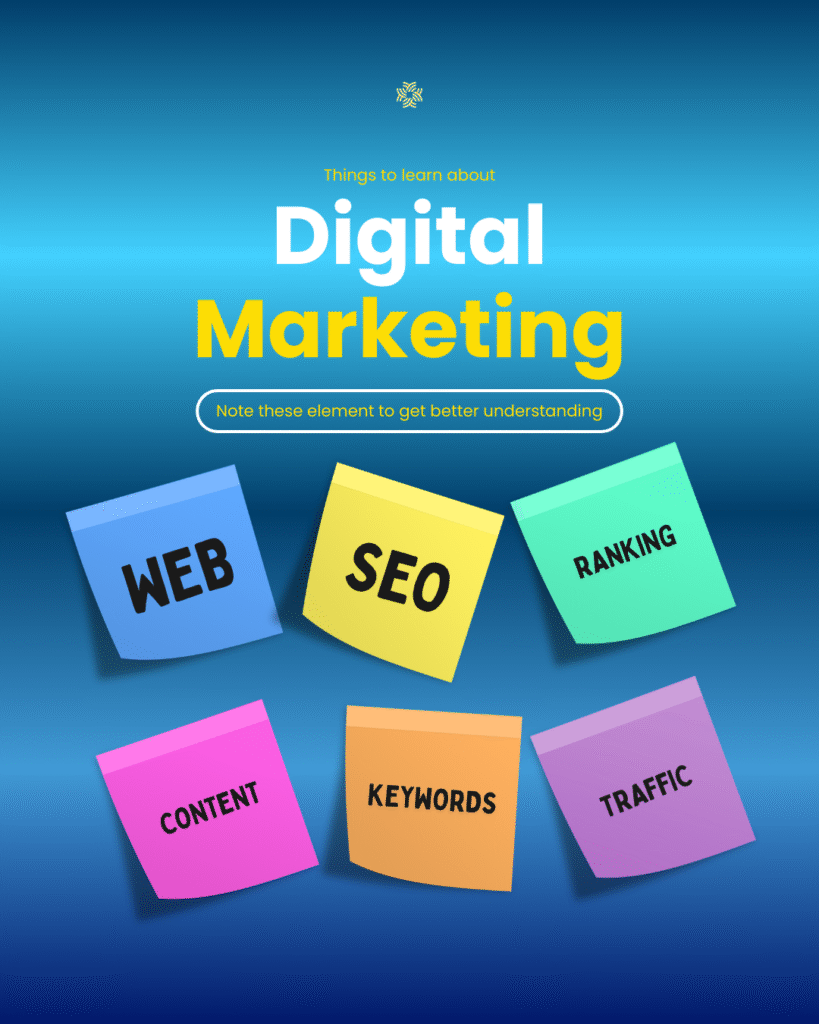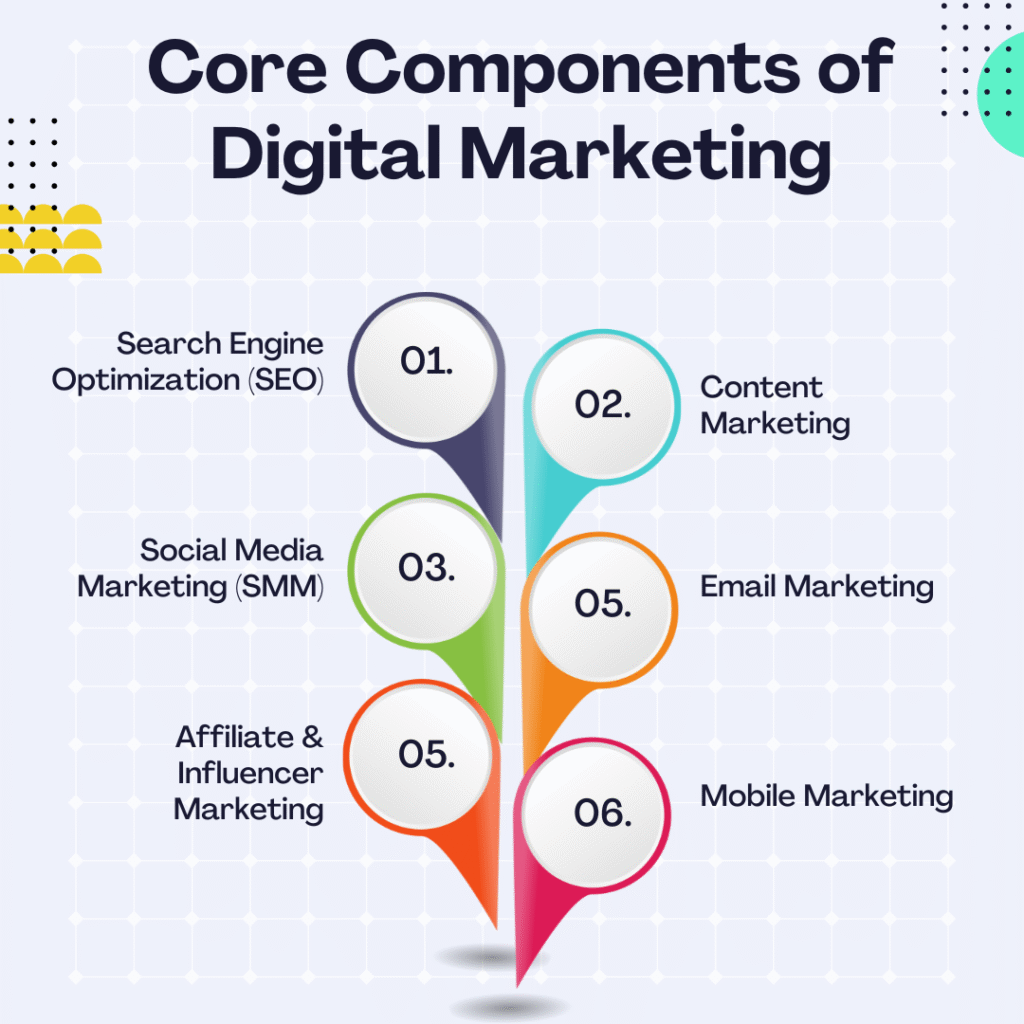Introduction

Digital marketing is the advertisement of products or services through the online channels of search engines, social media, email, and websites. It assists companies to reach more people at a less expensive rate than the traditional ways. The conventional marketing method uses print, television, or radios whereas this marketing uses the internet-based mediums. Customers today spend the majority of their time surfing the internet. It has the ability to make the brand more visible, create trust, generate lead, and make sales highly effective.
Evolution of Digital Marketing
The internet and social media have disrupted the way businesses interact with customers because they allow real time communication, reach customers worldwide and interactive brand experience. Social networks such as Facebook, Instagram, and LinkedIn enable the direct endeavor of the brands to the target population and establish trustworthy relations. As the mobile-first era emerges, individuals turn into the consumers of content, shoppers, and communicators via smartphone and, as a result, mobile-optimized marketing mixes are becoming imperative. Also, AI, automation, and big data have transformed this marketing through providing individualized suggestions, predictive analytics, and automated campaigns.
Core Components of Digital Marketing

- Search Engine Optimization (SEO)
Search engine optimization revolves around on-page, off-page, and technical optimization that are fundamental and target content, back links, and the performance of a web site. Key word research is used to determine the appropriate words that are being searched by the users, whereas SERP ranking indicates visibility. The combination of them helps to increase traffic rates, online presence, and brand authority in the online marketing industry.
- Content Marketing
The power of blogs, videos and infographics is that they attract, inform and engage the audiences. By telling stories and creating value-based content, brands can also reach the emotions and educate and develop trust with their target audience. It is an effective strategy to increase involvement, as well as to generate traffic, convert it, and enhance customer loyalty over time.
- Social Media Marketing (SMM)
The strongest social media to utilize in promoting the brand, engaging the audience, and generating leads include Facebook, Instagram, LinkedIn, and Twitter. Companies can expand by organic measures such as regular posting and building the community or by the application of paid methods such as targeted advertising. By having a balanced mix, there is maximum reach, visibility, and ROI achieved in this marketing.
- Email Marketing
Lead nurturing and automation assist companies to establish a rapport with their potential clients by sending relevant messages to them at the right time and place. Individualized campaigns are fuelled by data and insights and generate personalized experiences that appeal to the needs of individuals. Combined, they enhance the level of engagement and boost trust and the level of conversion, and email marketing is very productive.
- Pay-Per-Click (PPC) Advertising
Facebook Ads and Google Ads are potent platforms which enable a business to pinpoint on a specific audience and are quick to attract traffic and convert. The measurement of ROI is essential to follow up ad performance, budget optimization, and maximum results. Comparing cost to returns, the business will be able to make sure that the campaigns will be profitable and will provide sustainable increase.
- Affiliate & Influencer Marketing
Such partnership models as affiliate and influencer marketing assist brands in reaching more individuals via trusted influence and joint promotion. The two will build long-term customer relationships, increase brand loyalty, and promote sustainable growth of this marketing initiatives.
- Mobile Marketing
App-based marketing provides personalized notifications, in-app offers, and flawless user experiences, which attract and retain customers, and make sales. SMS and WhatsApp campaigns are direct, instant and the open rates are high thus effective in promotions, reminders as well as customer care. They work together, which guarantees more connections and increased involvement in mobile marketing plans.
Benefits of Digital Marketing
This marketing provides business players with a worldwide scope in which they are able to reach people outside the geographical borders and explore new markets easily. It offers inexpensive campaigns unlike the traditional advertising in which even small business can compete with other bigger brands with targeted approaches. Analytics and tracking of performance make it one of its largest strengths and allow businesses to track their performance, optimize their campaigns, and achieve as high ROI as possible. Besides, it’s also promotes customer interaction with interactive content, social media and personalized communication.
Challenges in Digital Marketing
There is a lot of competition in digital marketing, and brands as competing entities fight to be noticed as the rest of the players are also competing to win the attention of the same audience. Moreover, customer trust is an important aspect to be considered when creating and sustaining the reputation of the product or service because people are becoming more sensitive to the way their data is gathered and processed. Strict adherence to privacy and data protection laws, including GDPR in the European Union, and the Indian privacy laws is an additional complex burden. To be credible and effective, marketers should embrace open actions, the safety of information, and personalized and respectful communication.
Latest Trends in Digital Marketing (2025)
Digital marketing is changing with AI-based applications such as chatbots and personalization engines that provide a customized experience and immediate customer service. Voice search and smart speakers are transforming the SEO techniques meaning that brands need to be optimized in talking queries. Reels and Shorts are a significant part of content that should be used in the modern campaign because these formats are more engaging and shareable.
Digital Marketing Strategies for Businesses
In the case of startups, it is about brand recognition, low-cost platforms, and quick customer acquisition which are frequently based on social media, influencer programs, and content marketing. SMEs focus on establishing a large customer base, local search engine optimization and target marketing to achieve maximum returns with small budgets. Multi-channel approach, sophisticated analytics, and automation are implemented by large businesses to address the scale, brand consistency, and reach out to the world.
Measuring Success in Digital Marketing
The major indicators such as CTR, CPC, ROI, and Conversion Rate can be used to gauge efficiency of the campaign and streamline the performance. Google Analytics helps to monitor the behavior of users, SEMrush facilitates search engine optimization and market research, and HubSpot facilitates customer relationship management, automation, and inbound marketing. When used together, they can offer practical insights on smarter more data-driven marketing directions.
Future of Digital Marketing
Digital marketing is being redefined by metaworld and Web 3.0 which is providing immersive, decentralized experiences where brands get to engage users on the virtual world, NFTs, and transparency achieved through blockchain. Marketing that is ethical and sustainable is becoming more popular due to the fact that consumers are attracted to the brands which care about social responsibility and eco-friendly methods, not to mention honesty in communication. This drastic change will strengthen the reputation as well as create long-term trust. Customized personalization is customer-centric and will always be the center of focus, and data-driven insights are providing businesses with the capability to offer personalized recommendations, offers and experiences.
Conclusion
In the current competitive environment, digital marketing is necessary to grow, be visible, and engage customers. Businesses ought to concentrate on personalization, insights that are data-driven and multi-channel strategies and yet maintain trust and compliance. Innovation and consistency in this marketing is the way to achieve sustainable success, better customer relations, and flexibility in an ever-changing digital world.
Q1. What is digital marketing?
Digital marketing refers to the act of advertising products/ services through online platforms such as search engines, social media, email and web pages to connect and interact with the target customer or audience.
Q2. What is the importance of digital marketing to businesses?
It assists companies to become more known, attract international customers, create leads, sell products and develop effective customer relations at a relatively low cost.
Q3. What are the key forms of digital marketing?
These are the key ones, namely SEO, Content Marketing, Social Media Marketing, PPC Advertising, Email Marketing, Affiliate Marketing and Influencer marketing.
Q4. What are the tools of digital marketing?
Some of the most popular services are Google Analytics, SEMrush, HubSpot, Mailchimp, Ahrefs, and Canva to conduct analytics, conduct SEO, use CRM, automation, and create content.
